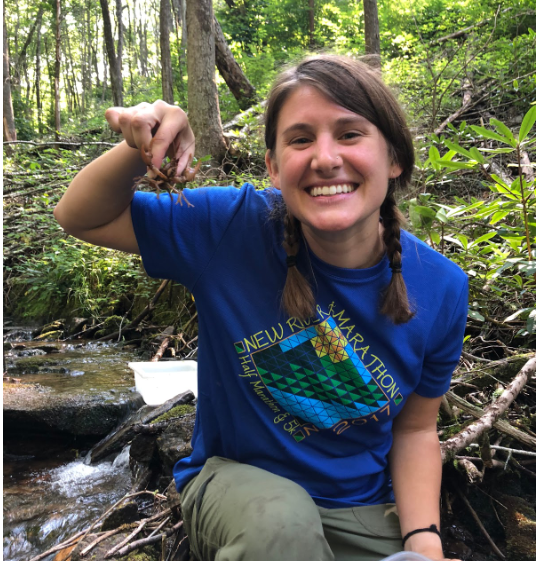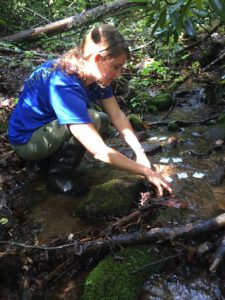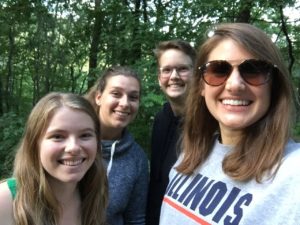
Grad student Kelsey Solomon thoroughly enjoying field work at her Coweeta LTER field site.
Credit: Kelsey Soloman
This spotlight is part of an ongoing series featuring many of our wonderful LTER Network graduate student representatives who contribute valuable research and leadership across the network. To learn more about graduate research in the LTER network, visit this page.
Kelsey Solomon is a graduate student at the University of Georgia, where she’s been conducting her research at the Coweeta LTER for the past 5 years and is currently an LTER graduate student representative. Originally from Tennessee, she received her undergraduate degree in Biology and History at the University of Alabama. She first taught middle and high school science in Indiana for 4 years before realizing she wanted to teach at a higher level, which led her to graduate school. Kelsey Fennell, communications fellow at the LTER Network Office, interviewed her about her experiences with LTER.
KF: What is your research focus?
KS: Broadly, my personal research focuses on how changes in forest riparian vegetation affect stream algal communities via changes in light availability. So I think a lot about stream algae and with that research I’m also trying to better understand how those changes in algal communities might affect trophic dynamics in stream ecosystems generally.
KF: And how would you try to describe your research to some of the middle schoolers you may have taught?
KS: That is a fair question since I do a lot of outreach and a good amount of explaining. I usually talk about how when everyone goes to a water ecosystem, they see the green slimy stuff on rocks, which is algae. And algae is super cool since they’re primary producers, just like trees. And in fact, diatoms, the type of algae I study, produce about a fifth of the oxygen we breath!

Kelsey arranging tiles for algae collection in a riparian system.
Credit: Kelsey Solomon
KF: Why are you passionate about your research at Coweeta?
KS: Just the idea of getting to work in an ecosystem that I grew up hiking in and that sparked my interest in ecology, is super exciting. Growing up in the Southern Appalachians and now getting to do research here that impacts management and conservation decisions is super special.
KF: What does a typical day of research look like at your site? Are there seasonal changes?
KS: Since I’m based at the University of Georgia in Athens, we can make day trips up to the Coweeta field site. On a longer day we drive between different sites which can add an hour and forty-five minutes to the drive. And I’ll do the same field work through summer, fall, winter, and spring, but in the Summer, I’ve planned a few longer projects where we’ll stay in the dorms at Coweeta for a few weeks or so.
KF: What do you do as a grad rep? How do you think you’re helping connect other students?
KS: I think being the grad rep has been kinda two parts for me. The first is connecting with the other grad reps at the different LTERs, and getting to hear about the resources that are available to us and what research is going on in other places and how we could potentially collaborate. And the other aspect is relaying that information to the graduate students at the Coweeta LTER, which can be sometimes a challenging job because the number of graduate students is constantly changing, we’re at all different universities, and just kinda trying to get everyone on the same page. Especially since the LTER network is so great and there are so many opportunities to get involved, I just want to make sure everyone knows about them.
KF: What do you like most about working at an LTER site?
KS: My one singular favorite thing working at the LTER site are the people I’ve gotten to know and work with. Some of the more senior researchers have been working at this one site for decades and they’re really just such a wealth of information and I love being able to just pick their brains about various aspects of our projects and how the ecosystems have changed over the years. Research can never be done alone, and the collaboration, the more there is, the better science we can do, and that’s just been a really great part of being at the LTER.
KF: What is something that’s been a challenge for you coming back into research after a few years of teaching? And what do you think is the biggest challenge for early career researchers?
KS: In the research field, our currency is really publications, and when you’ve taken a different route like me, teaching middle school and high school science, you might not be up to speed with other people starting at the same time, but in another way, using a different path gives you a lot of great soft skills. Yeah, keeping up with publication numbers and grants can be pretty challenging for early career researchers which is why working with an LTER site as a grad student is great since there’s some continuous funding already in place.
KF: What are some of the most surprising or unexpected experiences you’ve encountered while working at your LTER site?
KS: I’ve had a few funny experiences. So after however many years and days of field work, I always expected to see more wildlife, and I’d never seen a black bear. But on my very last day of finishing my field work for my dissertation research, I was in the car and I saw a bear and three cubs crossing the street. It was the cutest thing and it felt like a sign, thanking me for my years of field work.

Kelsey leading a team of undergraduate students to do field work.
Credit: Kelsey Solomon
KF: What are the next steps in your career and what will you bring with you from your experiences at the LTER site?
KS: I’ll be graduating in spring, and then I’m hoping to continue on with two or three years of postdoc work to really hone my research skills. Eventually I want to teach at the college level, especially at a minority serving institution. I’m always trying to improve my collaboration and leadership skills, which I think are two things that LTER has helped me with, especially with scientific collaboration. I’ll definitely try to connect my undergraduate students with opportunities at LTER sites to help them get that research experience they may want.
KF: What advice do you have for undergrad students trying to be researchers?
KS: You know, a lot of research is not just about memorizing facts. A lot of undergraduate courses are about regurgitating facts, but you know if you can’t remember every step of the Krebb’s cycle, it’s okay. It does not mean you’ll be a bad researcher. Research involves critical thinking, not just memorizing. Don’t give up!
KF: What’s one other LTER site you’d love to visit?
KS: I’d love to spend time at the Hubbard Brook site, since it’s sorta’ our northern counterpart, just to be able to spend some time in Northern Appalachia to compare and contrast.










